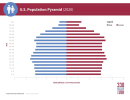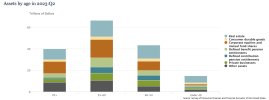Some interesting points, but it makes it sound like there's only so much wealth that gets distributed. That's a suspect viewpoint. Wealth is created; it doesn't fall from the sky like rain, with droughts on one generation and floods on another.
To me, the more interesting discussion would be why boomers seem to hold more wealth. Did they create more? Did they spend less? Invest better? Make different/better job choices? Are boomers more savvy about money management than millennials? There are dozens of possible reasons, but that's what should be explored. It's not enough to just point out a disparity.
One interesting consideration is that millennials are much more likely to hold a college degree than boomers. But what fields did they study? How many of those majored in Mayan architecture or 14 century poetry? I really don't know, but some studies have shown that millennials took longer to land good jobs than boomers did. This might be indicative of a difference in job availability, and it might indicate a difference in job skills.
I'll also note that college costs skyrocketed, putting those educated millennials much deeper in debt than boomer graduates. That impact shouldn't be underestimated. Debt is an incredible drag. Getting ahead while deeply in debt is like trying to swim with a brick in each hand.
Oh, and just for reference, I'm a late-model boomer and an early retiree.
More comes down to opportunity than anything else. The "greatest generation" set the pattern in the 70s when they were in political power. Borrow money, which is future consumption spent today. A few key points that have driven the debt that drags on Gen X and later.
1. In the 60s, companies went with defined benefit programs. Effectively many of these programs placed huge economic burdens on the companies, but left out huge swaths of the population once people retired. This led to the growth of Medicare.
2. In the 70s, banks recognized that people had a lot of equity in their homes. They started to push/sell HELOCs hard. This was a new way for consumers to leverage their assets to spend more money now.
3. In the 80s, the federal government got in the game. President Reagan and Speaker Tip O'Neil made a deal to solve the short term debt problems but did not address the structural problems that entitlements represented. If you web search you will find the trustee reports predicting the predicament we are in now.
4. In the 90s, the boomers really came to power. They had learned from their parents generation to kick the can down the road. To fund the entitlements, money needed to come from somewhere. Well, young people do not vote. So, the portion of the school costs for college/university/trade school started to decline while costs were rising.
5. In the 2000s, medical costs continued to be a major drive of cost issues at college/university/trade schools; since by its very nature this is a labor intensive effort. Boomers effectively blocked any attempt to actually reign in medical costs, and forced society to attempt to stay on a defined benefit program for retirees.
6. In the 2010s, the situation stayed the same. We just kept getting deeper in the hole.
7. Now in the 2020s, we are effectively broke, and the future generations are largely screwed.
The point being, as others have said, debt is a drag, and having debt prevents society from presenting opportunities to future generations. And as a generation, boomers learned from their parents on how to screw the future generations, and did an even better job of it.
So, while all this was going on. A few other critical factors were happening to make people feel good, but actually hurt the society:
1. Globalization was occurring. Companies began to chase the lowest cost labor markets. This sucked employment away from the USA; but made lots of material stuff cheap.
2. As part of globalization, the US went from an export driven economy to one powered by consumerism.
3. The pace of technical innovation was increasing. This was raising the required skills for an increasing percentage of the jobs still locally available.
4. One of the results of #3 is more education is required, at the same time social support and spending for additional education was declining. The result, a larger and larger share of the cost of education was moved from the public purse to the individual.
5. WallStreet shifted the focus of many companies away from long term strategies toward the next quarter. The result, is companies have little to no incentive to invest in employees, or loyalty to the employee. So companies no longer want to hire the entry level position and grow/invest in the employee. They want to hire someone already experienced and can hit the ground running.
Those are the ones I am aware of. I am sure there is more. The point is, it is not any one thing, it is the sum total of many factors. Each of which has largely destroyed the ability of future generations to create wealth.
Tim






